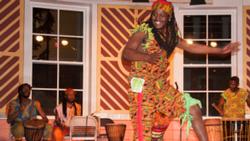A&E
A celebration of African culture
By Brian Burns ’17
March 6, 2015
“To Africa and Back” was Black and Latino Student Union’s celebration of African American culture to conclude Black History Month as well as a meditation on African American identity in America in the wake of events such as Ferguson.
The President and Vice President of BLSU introduced the first act of the night: Tropical Sol. The men of the dance group were dressed in crisp black button-downs while the women opted for dazzling red dresses. The dance group performed two dance numbers that demonstrated the students’ dexterity, complete with dips and lifts aplenty. Jasmin Thomas ’15 followed up Trop Sol’s performance with a spoken word piece about African American identity. Thomas gained momentum over the course of the poem, reaching a passionate pitch with the final line, “I broke my back trying to boogie down.”
The night continued with an acoustic version of Bob Marley’s “Redemption Song” by Hunter Dansin ’16 and his friend on guitar. The song, stripped down to its bare essentials, had a subtle and heartfelt quality. In the interlude between songs, Dansin took a moment to explain how the blues started on plantations, where slaves expressed their deep sorrow through song. Dansin’s second song, “Hard Time Killing Floor Blues,” was originally written by Skip James and described time spent in a Chicago stockyard. Hunter described how the song evokes the parallels between the killing floors of the North and the cotton fields of the South. Dansin’s rendition of the song was delicate and transfixing.
After a brief intermission, the night’s subjects turned to more solemn topics. Kiana Sosa ’15 performed a Langston Hughes poem, “Let America Be America Again.” The poem laments how America, or the “America” everyone imagines, was never truly idyllic. However, the poem offers the suggestion of hope that we can fulfill the promise of America. Sosa, so phenomenal in her role in January’s production of The Mountaintop, once again demonstrated her gift for spitting words at a high velocity. It is surprising (but at the same time, not so surprising) how Hughes’ words still ring true today in an America that has been proven to be anything but a “post-racial” society. Marquis Palmer ’18 offered a poem about mass incarceration and its black community, dedicating it to a family member. It was a sobering reminder that African Americans make up 1 million of the total 2.3 million members of the U.S. prison population, according to the NAACP.
The final performance of the night was by a group of musicians from the Wacheva Cultural Arts Center, led by Biboti Ouikahilo. The musicians drummed onto the stage in traditional, colorful African garb. They performed a number of songs dedicated to such subjects as “harvest” and “unity.” Each musician had his own moment to dance at the center of the barn in a solo performance. However, despite the upbeat nature of their drumming, one musician articulated that, “everything is not easy” for African harvesters. For example, in his home, the Ivory Coast, the harvest people are poor despite the country being the top producer of cocoa beans. The night ended with a dance lesson, in which the musicians encouraged students to get up from their seats. The attempt to have the audience cross and uncross their feet at such high speeds left many with tangled legs.
Overall, the night served as an appropriate commemoration of the past of African and African American culture while also looking toward the future.





